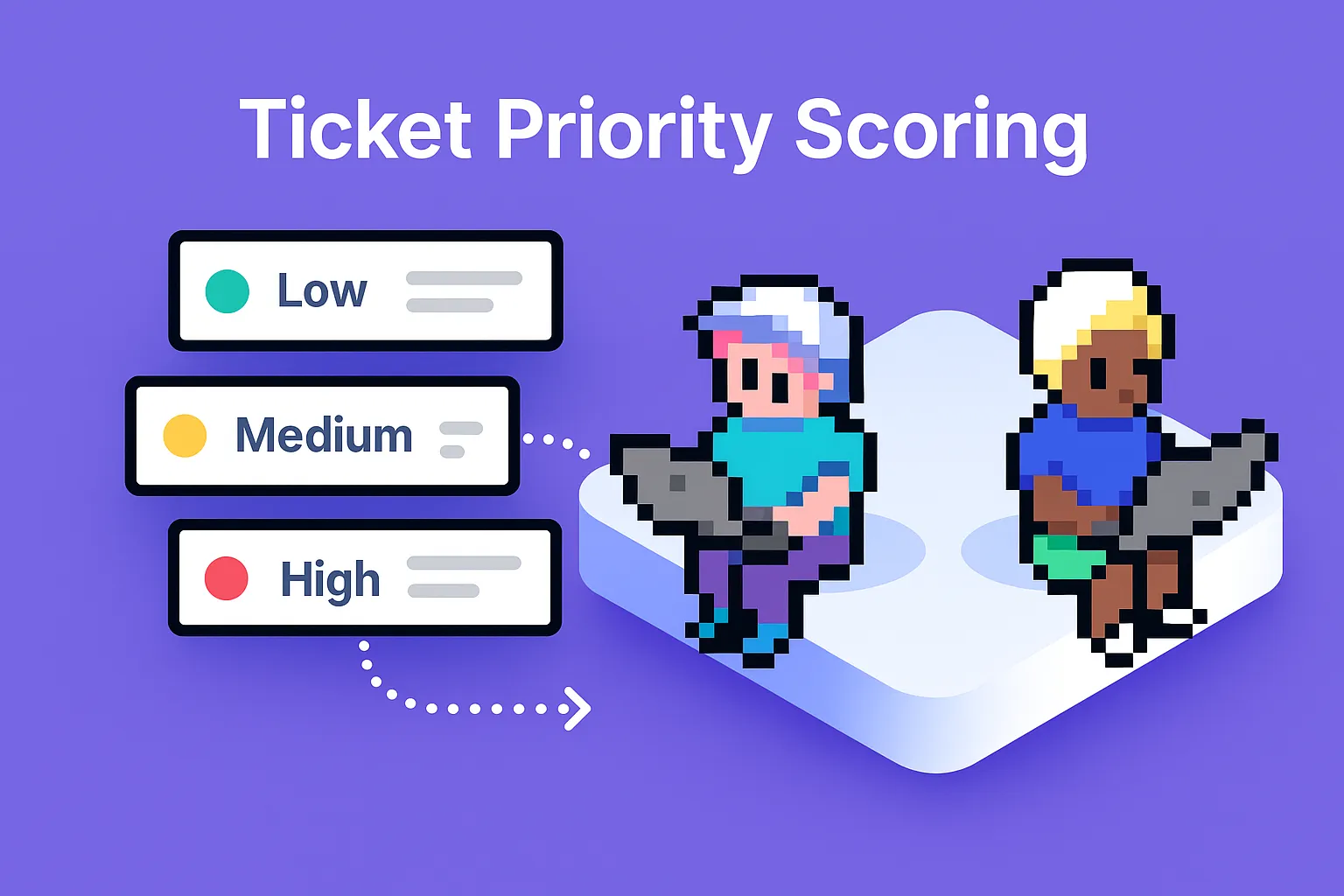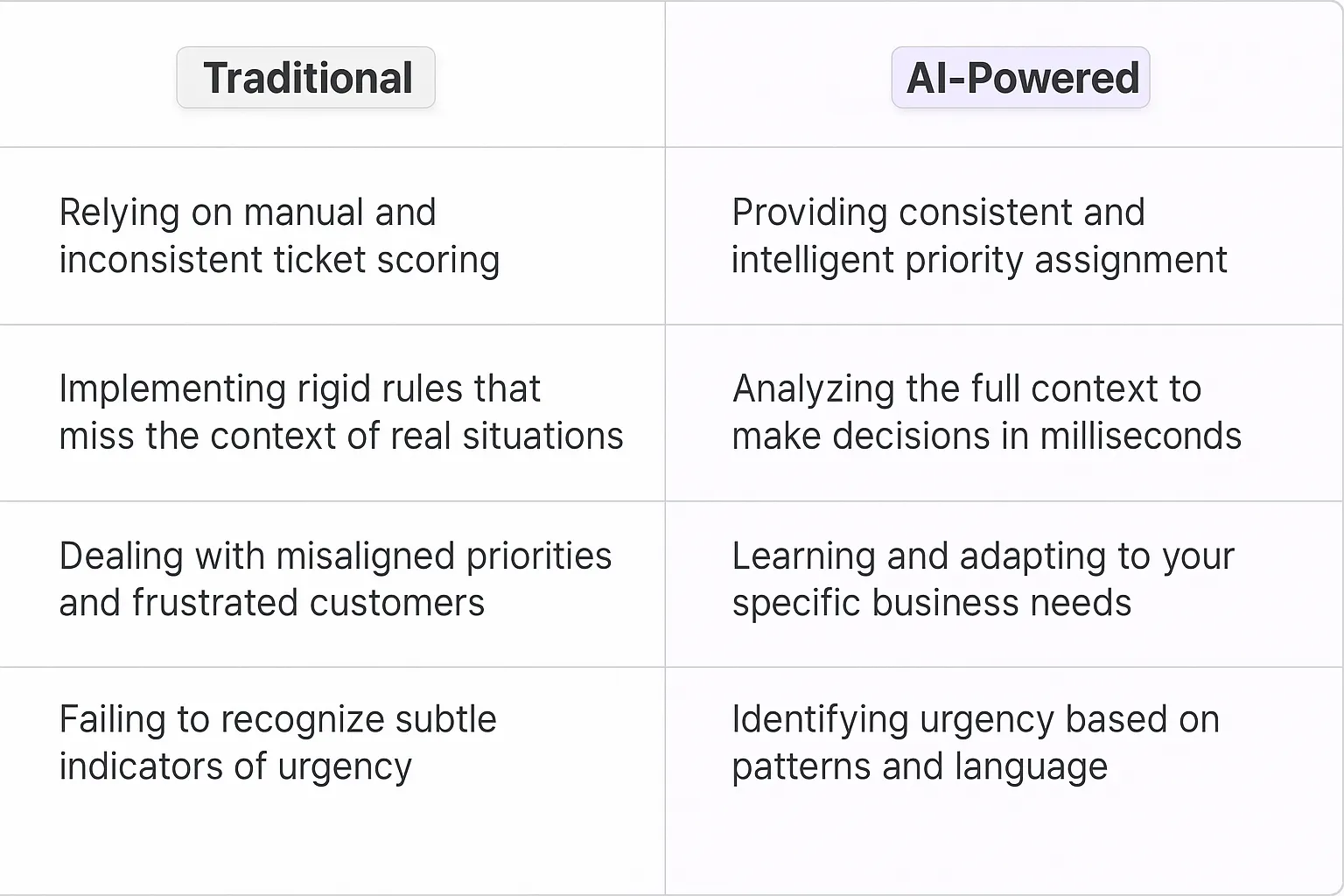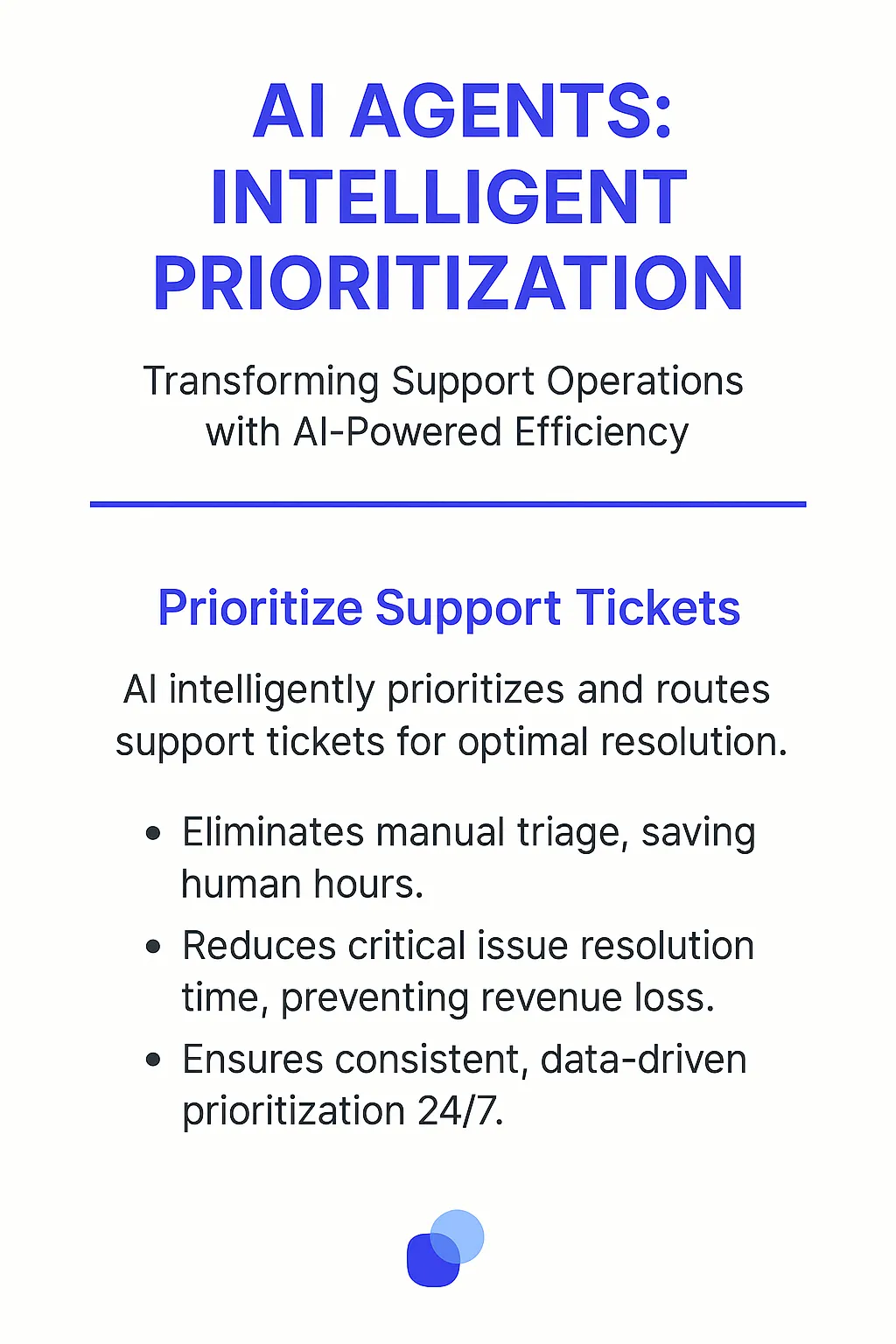Ticket Priority Scorer AI Agents
Understanding AI-Powered Ticket Priority Management
Ticket Priority Scorer is an AI-powered system that analyzes support tickets in real-time to determine their relative importance and urgency. By processing factors like customer sentiment, historical patterns, business impact metrics, and contextual clues, it assigns accurate priority levels that help support teams focus on what matters most. The system continuously learns from ticket resolutions and outcomes to refine its scoring accuracy over time.
Key Features of Ticket Priority Scorer
- Real-time analysis of ticket content and context
- Machine learning models that adapt to your specific business needs
- Integration with existing support platforms
- Automated priority assignment based on multiple data points
- Pattern recognition for early problem detection
- VIP customer identification and routing
- Business impact scoring based on revenue and customer data

Benefits of AI Agents for Ticket Priority Scoring
What would have been used before AI Agents?
Support teams traditionally relied on manual ticket scoring systems - basically humans eyeballing tickets and making gut calls on urgency. The process was riddled with inconsistencies. One agent might mark a password reset as "high priority" while another would label it "medium." This created a mess of misaligned priorities and frustrated customers wondering why their urgent issues got buried.
Teams tried implementing rigid rules-based systems with strict criteria, but these often failed to capture the nuanced context of real support scenarios. A ticket might technically check all the "high priority" boxes but actually be a minor issue in disguise. The result? Support queues that didn't reflect true business impact.
What are the benefits of AI Agents?
AI-powered ticket scoring brings consistency and intelligence to priority assignment. These digital teammates analyze the full context of each ticket - the language used, customer history, business impact, and timing - to make sophisticated priority decisions in milliseconds.
The real game-changer is how AI agents learn and adapt. They pick up on patterns in your specific business context - understanding that a checkout issue during Black Friday needs different handling than the same issue in February. They recognize subtle indicators of urgency in customer language and can differentiate between a frustrated VIP customer and a minor technical hiccup.
For support teams, this means:
- Consistent priority scoring across all tickets, regardless of which human agent handles them
- Reduced cognitive load - no more spending mental energy deciding if something is "high" or "medium" priority
- Better resource allocation as urgent issues are identified and routed immediately
- Improved customer satisfaction as critical issues get the rapid response they deserve
The most compelling aspect is how this scales. As ticket volume grows, AI agents maintain their accuracy and speed while human-only systems would buckle under the pressure. It's like having a seasoned support lead reviewing every ticket instantly, 24/7.

Potential Use Cases of Ticket Priority Scorer AI Agents
Processes
- Analyzing customer support tickets in real-time to determine urgency based on sentiment, historical patterns, and business impact
- Evaluating IT incident reports by assessing system criticality, number of affected users, and potential revenue impact
- Monitoring development bug reports to identify showstopper issues that could delay product launches
- Scanning internal help desk requests to prioritize issues affecting core business functions
Tasks
- Automatically tagging tickets with P0-P4 priority levels based on predefined criteria and machine learning
- Identifying VIP customer issues and escalating them immediately to senior support staff
- Detecting patterns in ticket clusters to spot potential system-wide problems early
- Calculating business impact scores for each ticket using revenue data, customer size, and SLA requirements
- Routing high-priority tickets to specialized teams based on complexity and urgency
- Generating priority reports for management to track critical issue resolution
The Growth Loop of Smart Ticket Prioritization
When we look at scaling support operations, ticket prioritization becomes a critical growth lever. The traditional model of manual ticket scoring creates a bottleneck that breaks under load. But what's fascinating is how AI-powered ticket scoring creates a powerful feedback loop.
The most compelling pattern I've observed is when teams deploy priority scoring agents across their support stack. These digital teammates learn from historical resolution data, customer outcomes, and business impact metrics. Each correctly prioritized ticket improves the model, leading to increasingly accurate scoring over time.
What's particularly interesting is the network effect that emerges. As more tickets flow through the system, the AI develops a deeper understanding of your specific business context. This creates a defensive moat - the more you use it, the better it gets, and the harder it becomes for competitors to replicate your support efficiency.
The end result? Support teams can focus on high-value work while routine prioritization happens automatically. This isn't just about efficiency - it's about building a sustainable competitive advantage through superior customer experience.

Industry Use Cases
The strategic application of AI agents in ticket priority scoring creates measurable impact across multiple sectors. When analyzing support ticket data at scale, these digital teammates excel at pattern recognition and rapid classification - skills that transform how organizations handle customer issues.
Looking at real-world implementations, we see companies moving beyond basic rules-based prioritization into sophisticated ML-driven systems that actually learn from historical ticket resolution patterns. This shift represents a step-change in how support teams operate.
What's particularly fascinating is how these AI agents adapt their scoring models based on industry-specific contexts. A high-priority ticket for a healthcare provider (potential patient safety issue) looks very different from an urgent e-commerce case (payment processing error). The AI recognizes these nuances and adjusts accordingly.
The most successful deployments I've observed combine machine learning capabilities with human domain expertise - creating feedback loops that continuously refine the priority scoring system. This human-in-the-loop approach ensures the AI remains aligned with business objectives while handling the heavy lifting of initial ticket assessment.
Healthcare Priority Scoring: Transforming Emergency Department Triage
The emergency department at major hospitals faces a constant flow of incoming patients, each requiring different levels of urgent care. Traditional triage systems rely heavily on human judgment and standard protocols, which can sometimes miss subtle indicators of serious conditions.
A Ticket Priority Scorer AI Agent deployed in emergency departments analyzes multiple data points simultaneously - vital signs, reported symptoms, medical history, and even subtle linguistic cues from patient descriptions. The agent processes this information through advanced natural language understanding and medical knowledge models to assign accurate priority scores.
What makes this particularly powerful is the agent's ability to detect patterns that might escape even experienced triage nurses. For instance, when a patient describes chest pain as "like a squeezing sensation" along with seemingly unrelated symptoms like mild jaw discomfort, the agent recognizes these as potential indicators of a heart attack, even if the patient appears otherwise stable.
The real magic happens in the background - the agent continuously learns from outcomes, adjusting its scoring algorithm based on actual emergency cases. If a patient initially scored as medium priority later develops serious complications, the system refines its understanding of risk factors.
One hospital implementing this system saw a 34% improvement in identifying high-risk cases that initially presented with subtle symptoms. More importantly, they reduced instances of serious conditions being incorrectly classified as low priority by 28%.
The key differentiator isn't just the scoring - it's the agent's ability to explain its reasoning. When the agent flags a case as high priority, it provides the medical team with specific factors that influenced its decision, supporting rather than replacing clinical judgment.
This approach to priority scoring represents a fundamental shift from reactive to predictive triage, where subtle pattern recognition in patient data inform rapid, life-saving decisions.
E-commerce Customer Support: Scaling Smart Prioritization
When I talk to e-commerce founders, their biggest scaling challenge isn't usually tech or product - it's managing the exponential growth of customer support tickets. A major online retailer I advised recently shared how their support team was drowning in 50,000+ monthly tickets, with no reliable way to identify which ones needed immediate attention.
The implementation of a Ticket Priority Scorer AI Agent fundamentally changed their support operations. The agent analyzes incoming tickets across multiple dimensions - purchase history, order status, customer lifetime value, sentiment analysis, and specific keywords indicating urgent issues like "wrong address" or "damaged item."
What's fascinating is how the agent picks up on subtle patterns that traditional rule-based systems miss. For instance, it learned to identify customers who use specific language patterns when describing product issues that typically escalate to chargebacks if not addressed quickly. These insights came from analyzing thousands of historical support interactions and their outcomes.
The results were striking: The retailer saw a 42% reduction in customer churn related to support issues. High-value customers experiencing serious problems got responses within 15 minutes instead of hours. But perhaps most importantly, support team satisfaction increased by 37% - they finally had the tools to focus on the most critical issues first.
The agent's learning capability proved particularly valuable during seasonal spikes. During Black Friday, it automatically adjusted priority thresholds based on ticket volume and type, ensuring critical issues didn't get lost in the holiday rush. The system identified patterns in shipping-related complaints that helped prevent a potential mass issue affecting thousands of orders.
What makes this implementation special is its integration with inventory and logistics data. When a customer reports a problem with a product that's showing unusual return rates, the agent automatically escalates the ticket and flags it for the product team - creating a feedback loop that extends beyond just customer support.
This isn't just about sorting tickets faster - it's about creating a dynamic support system that evolves with your business and customer needs. The most successful implementations I've seen treat the AI Agent as a core part of their customer experience strategy, not just a support tool.
Considerations & Challenges
Building an effective ticket priority scoring system requires navigating several complex technical and operational hurdles. The real challenge lies in creating a system that enhances rather than complicates your existing workflow.
Technical Challenges
Training data quality makes or breaks priority scoring models. Many organizations struggle with historical ticket data that's inconsistently labeled or missing key priority indicators. The model needs exposure to enough edge cases and priority patterns to make reliable predictions.
Integration complexity also poses hurdles - the scoring system must seamlessly connect with existing ticketing platforms while maintaining sub-second response times. Any latency in priority assignment creates friction in ticket workflow.
False positives present another technical obstacle. An overly sensitive model that escalates too many tickets as high priority can overwhelm teams and erode trust in the system. Finding the right balance requires careful threshold tuning.
Operational Challenges
Change management often proves more difficult than the technical implementation. Support teams may resist automated priority scoring, viewing it as a threat to their judgment. Clear communication about how the system augments rather than replaces human decision-making becomes crucial.
Priority scoring models also need regular maintenance as business needs evolve. Customer segments change, product offerings expand, and new types of issues emerge. Without consistent model retraining and threshold adjustments, accuracy degrades over time.
Metric definition presents another operational challenge. Teams must align on what constitutes different priority levels and how to measure scoring accuracy. Without this alignment, the system risks introducing more confusion than clarity.
Cross-functional buy-in is essential but difficult to maintain. Engineering teams need to trust the scores for SLA planning, while support teams must believe in them for ticket routing. Building this trust requires transparency into the scoring logic and clear escalation paths when the system makes mistakes.
AI-Driven Support Evolution: The Future of Ticket Management
The shift to AI-powered ticket priority scoring represents a fundamental evolution in support operations. When implemented thoughtfully, these systems create a powerful feedback loop that continuously improves support efficiency while reducing team cognitive load. The key to success lies in treating priority scoring not as a standalone tool, but as an integral part of your customer experience strategy. Organizations that embrace this approach gain a significant competitive advantage through superior support operations that scale effectively with growth.













